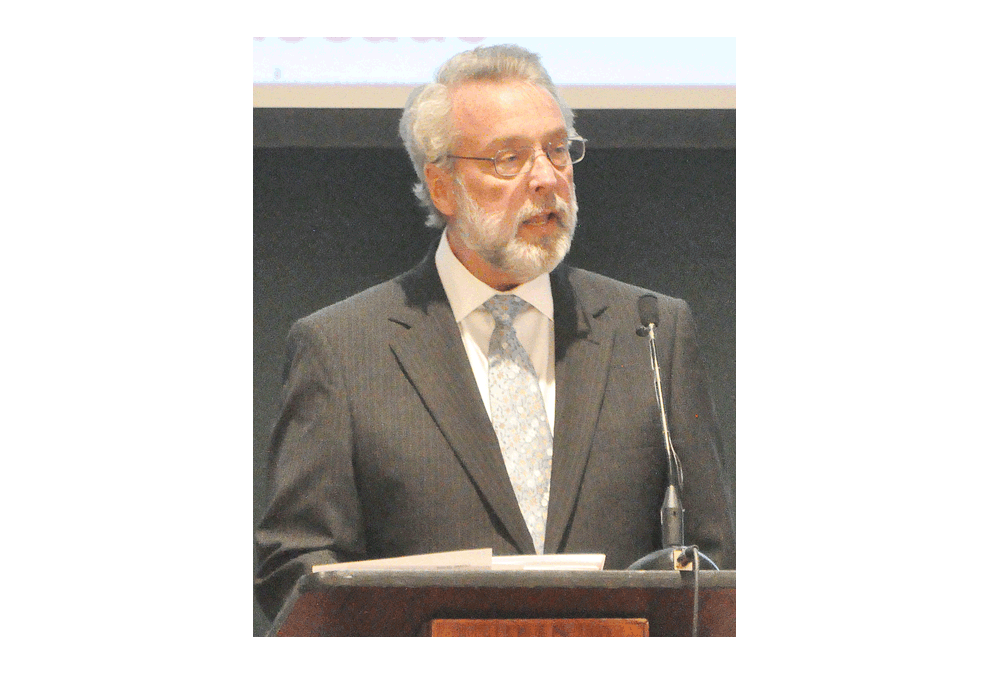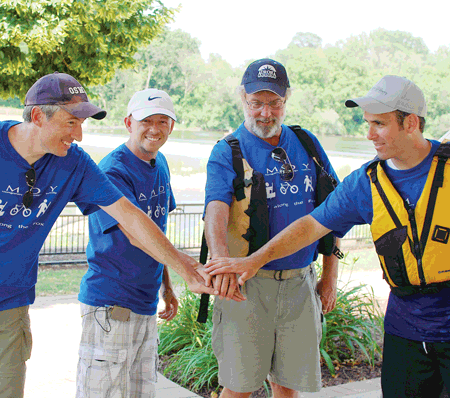
Tom Weisner, surrounded by his loved ones, passed away peacefully Friday morning, December 28, 2018, following complications from an extended battle with cancer. He was 69 years old. He was mayor of Aurora 2005 to 2016.
The official family statement: “While we are deeply saddened by the passing of Tom, we are grateful that he was able to spend his last days with those that loved him most.
He adored his family, his friends, and this community, more than words can express. We appreciate the outpouring of support from each and every person and take comfort in knowing that his commitment to serving people will never be forgotten.”
The wake will be from 2 p.m. to 7 p.m. both Thursday, Jan. 10 and Friday, Jan. 11 at New England Congregational Church, 406 W. Galena Boulevard in Aurora. The public memorial will be at 11 a.m. Monday, Jan. 14 at the Paramount Theatre, 23 E. Galena Boulevard in Aurora. A private burial will be in Marywood Cemetery in Aurora.
Weisner was diagnosed with colon cancer two years into his first term as mayor in 2007. Through two surgeries and more than a decade of treatment, Weisner continued to serve as mayor. In May 2015, he announced that he would not run for re-election and cited his on-going battle with cancer as the primary reason. In November 2016, he stepped down early to focus on his health.
One of Aurora’s most influential mayors, Weisner’s vision transformed the City of Aurora through investments in the public safety, infrastructure, arts, technology and the environment.
During his first run for mayor, Weisner pledged to lower crime, clean up the riverfront, and invest in infrastructure that would enable the revitalization of downtown Aurora and the surrounding neighborhoods.

Carter Crane/The Voice
Working with the Police Department, Weisner moved forward with plans to build a new police facility to give officers the modern tools and technology they needed to fight crime in the 21st Century. He prioritized community-oriented policing strategies and implemented changes to the police hiring process, which resulted an additional 15 to 20 officers on the street. Total crime dropped to historic lows, while homicides plummeted. In the 11 calendar years prior to Weisner taking office, more than 16 individuals were killed in Aurora on an average year with a high of 26. In the 11 years, after he took office that number dropped to an average of five homicides per year and in 2012, Aurora reported zero homicides, a remarkable feat for a city of 200,000 residents.
At the same time, Weisner embarked on an ambitious plan to clean up contaminated properties, which he believed stymied new development along the riverfront and throughout town. Through public/private partnerships, the City facilitated the clean-up and development of several developments. One of the most notable was appropriately named Thomas J. Weisner River Edge Park shortly after he stepped down as mayor. The expansion of Simon’s Premium Outlet Mall off Farnsworth was made possible through an extension environmental clean-up effort.
A lover of the arts, Weisner’s commitment to supporting downtown’s creative potential. He was influential in casting the vision that brought live theater back to the Paramount Theatre, which took on programming for Thomas J. Weisner River Edge Park. Shortly after retiring as mayor, Weisner stepped up to lead the fundraising effort for Paramount Theatre’s new School of the Arts, a public/private partnership effort among the City, Aurora Civic Center Authority Board and a private developer, The Community Builders, who will offer affordable artist lofts in the building.
Confronted with the reality that downtown’s water, sewer and roadway structure could not support his vision, early in his tenure, mayor Weisner prioritized repairing and upsizing Aurora’s underground infrastructure. Without these improvements, much of the development along River Street and throughout downtown Aurora would not have been possible.
Weisner adored children, never hesitating to visit a school or invite a scout troop to his office. Children, he said, were the “best hope for our future.” Upon learning about a severe lack of early childhood education options in Aurora, he championed the formation of SPARK – a local collaborative initiative to ensure that preschoolers are Strong, Prepared And Ready for Kindergarten. He championed being partners with District 131 to transform the former City Community Center into the Fred Rodgers Magnet Academy. He was instrumental in the development of Waubonsee Community College’s campus downtown. And, District 129 honored his work promoting Harvard University’s Pathways to Prosperity education project, when they announced that one of the District’s career pathway programs would be housed in a new building to be named the Weisner Family Center for Career Development.
In 2015, Aurora was heralded by the Intelligent Community Forum as one of the Smart 21 Communities internationally. The group recognized mayor Weisner’s forward-thinking technology investments as a model for other cities world-wide. During Weisner’s tenure, Aurora invested millions in underground fiber optic cable to provide high speed connections to public facilities, infrastructure and eventually even private businesses. The original $7 million investment paid off substantially. By the time Weisner left office, the City had received more than twice that amount in grant dollars to improve traffic flow through an interconnected traffic management system. The investment was also key to attracting two major data centers to Aurora, as well as several new technology companies.
Known as a tenacious advocate for the people of Aurora, Weisner was unafraid to take on what others deemed impossible. For years the Eola Road Interchange was planned, but few believed that the multiple property owners and governmental entities would be able to agree to terms to get it done – but that’s just what Weisner did. As a result, Illinois Governor Pat Quinn later appointed Weisner to the Illinois Tollway Authority Board where he was an advocate for Western Access to O’Hare and championed planting native plants along Tollway frontage to increase Monarch butterfly habitats.
When Canadian National purchased the sleepy EJ&E railway line, Weisner refused to allow the behemoth international corporation more than quadruple crossing times without putting up a fight. Weisner led a coalition of communities along the rail line in opposing the impacts. As a result of his advocacy, the federal government required the company to pay an unprecedented 2/3rd of the cost to build the overpass for the tracks at Ogden Avenue. Weisner went on to become a sought after expert on railway safety concerns.
To further boost business along the Route 59 retail corridor, Weisner supported what was, at the time, the largest residential development project in the suburbs – totaling nearly 1,400 residences. The ambitious, transit-oriented development plan paved the way for the completion of Station Boulevard, which connects Fox Valley Mall to the Route 59 Metra Station. Improvements also included major upgrades to the Route 59 Transit Center, including the addition of 450 new parking spaces.
In 2017, after he left office, mayor Weisner was honored by the American Public Works Association as the nation-wide winner of its Exemplary Service award. The group recognized Weisner’s work in forming the Northwest Water Planning Alliance – a regional group with more than 80 communities dedicated to helping communities provide a long-term sustainable water supply. The award also noted Weisner’s commitment to sustainability in building the new Police facility, implementing water conservation measures and supporting green technology – such as the rain gardens throughout town.
Believing that municipalities can do more when they work together, Weisner served as Chairman of Metro-West Council of Governments and in 2015 DuPage Mayors and Managers Conference honored Weisner with its Governmental Leader of the Year award. Among the highlights, the group recognized mayor Weisner’s leadership on public safety pension reform. A former union organizer, mayor Weisner, armed with data and statistics from Aurora’s own pension crisis, implored elected officials through the state to overhaul the public safety pension system. Without reform, Weisner warned that many municipalities would be unable to meet their future pension obligations to retirees.
Weisner’s commitment to local organizations that lend a helping hand to people in need was unparalleled. His administration spearheaded the redevelopment of the Aurora St. Charles Living Center, to give local residents an affordable retirement option. Today, the community room bears his name. The Fox Valley United Way honors mayor Weisner’s legacy with its annual Thomas J. Weisner Humanitarian Award.
Prior to running for mayor, Weisner worked for more than 18 years in as an executive in Aurora, where he spearheaded the creation Aurora’s customer service center, as well as the redevelopment of the historic Roundhouse.
Weisner began his career in the private sector before being accepted into the Peace Corps, where him and his wife Marilyn provided health and other services to the native population on the Island of Guadalcanal in the Solomon Islands.
Weisner was loving husband, doting father and loyal friend. He is survived by his wife Marilyn Hogan Weisner, son Anthony (Wife) and two granddaughters. He was preceded in death by his son, Thaddeus, who died from complications of Cerebral Palsy in 2006.

Aurora mayor Tom Weisner at the RiverEdge Park, John C. Dunham Pavilion ribbon-cutting Friday, June 7, 2013. The Park later was named the Thomas J. Weisner RiverEdge Park.
Jason Crane/The Voice

